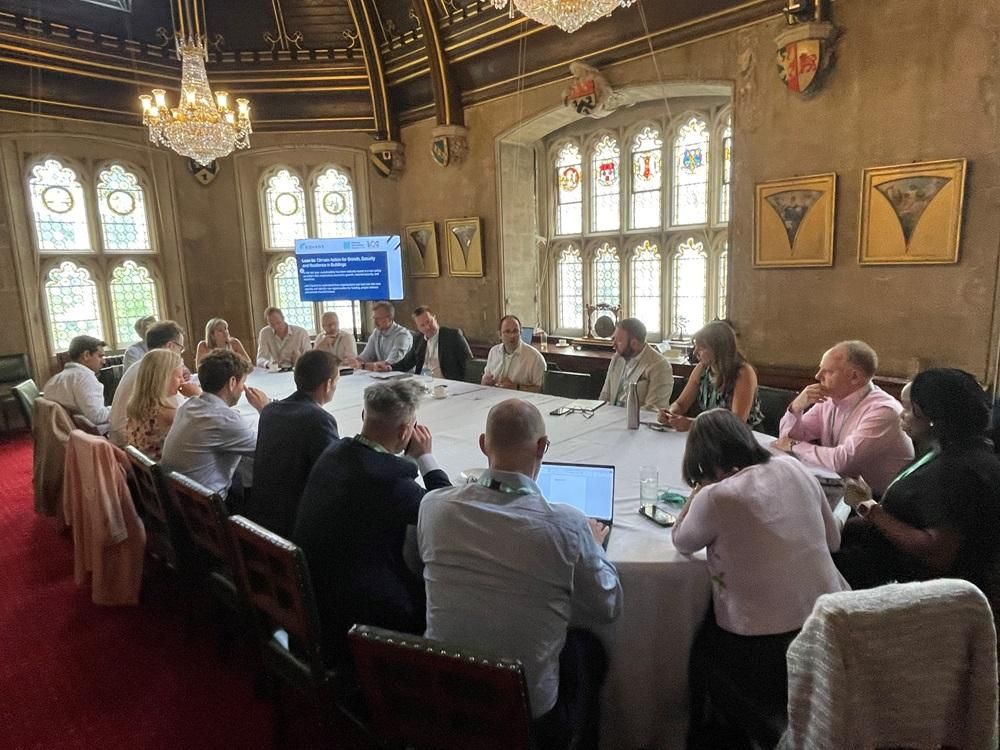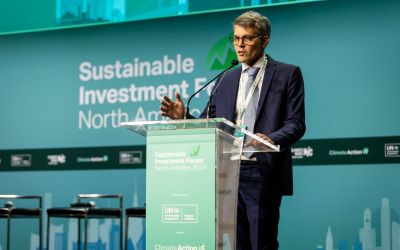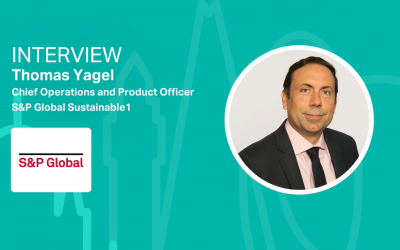From Net Zero to Resilience: Five Insights from the Equans Roundtable at CIF 2025
As part of this year’s Climate Innovation Forum at London’s Guildhall - the flagship event of London Climate Action Week - Equans convened a focused roundtable exploring how organisations with large estates and infrastructure can adapt to a shifting policy and investment landscape in the UK.

Chaired by BusinessGreen editor James Murray, the session brought together senior leaders spanning public sector organisations, asset managers, academics and climate adaptation specialists.
The discussion centred on a crucial theme: how climate action within the built environment can evolve in response to a national narrative increasingly framed around economic growth, national security, and resilience - identifying new opportunities for funding, project delivery and service transformation.
There were five key insights that emerged from the conversation - each revealing a challenge, a shift in thinking, or an opportunity for leaders navigating the next phase of delivery.
1. Net zero messaging is too abstract
Across the public and policy space, ‘net zero’ as a term appears to be waning - not in intent, but in impact. Several participants noted that while political rhetoric now centres on security, economic growth and resilience, net zero is still the underlying objective.
The words ‘net zero’ however do not resonate particularly well in public engagement and would be better framed in terms of improving fuel poverty, health, air quality and liveability. One participant shared how referrals for an energy efficiency support programme jumped significantly when the narrative shifted from emissions to energy savings for vulnerable households.
The message was clear - we need to meet people where they are. That may mean using the phrase ‘net zero neighbourhoods’ less in public-facing contexts, even if that’s exactly what is being delivered.
2. The public sector has run out of easy wins
There was near-universal recognition that the Public Sector Decarbonisation Scheme (PSDS) helped build essential internal capabilities and unlock early-stage carbon savings. But its planned phase-out, combined with the limited remit of GB Energy and a more fragmented funding landscape, creates a widening delivery gap.
Many local authorities have already acted on the ‘shovel-ready’ assets - relatively simple solar, lighting or controls projects. What remains are the capital-intensive, technically complex, and politically sensitive challenges: deep retrofit, electrification of heat, decarbonising vehicle fleets. These require new delivery models and significantly greater long-term finance.
The Warm Homes Plan was welcomed as a step forward on the domestic front, but the gap in support for non-residential public estates was a significant point of focus.
3. Climate resilience is the missing pillar
While net zero remains centre stage, many participants voiced concern that climate resilience and adaptation remain underdeveloped and underfunded - despite extreme heat, flooding, and infrastructure disruption already taking hold.
The challenge was framed during the discussion as an equation:
Ageing buildings + maintenance backlogs + today’s climate = serious unknown risks.
Many public buildings were not designed for today’s climate, let alone what’s to come. Backlog maintenance issues are widespread, and in many cases, climate risks are going undetected because asset-level risk assessments aren’t being carried out.
In a policy environment focused on growth and resilience, this is a missed opportunity. Retrofitting buildings is not just a mitigation strategy, it’s a fundamental act of adaptation, especially for critical public services.
4. We need better financing models and smarter collaboration
To move beyond the current delivery ceiling, blended finance models are essential. Participants discussed the potential of bundling projects into aggregated investment portfolios that combine high-return ‘easy wins’ with more complex, community-serving initiatives like heat networks or social housing retrofit.
However, public sector procurement frameworks and governance structures can inhibit change. What’s needed is standardisation in delivery, without generalising away from risk — a theme that resurfaced throughout the conversation.
Several examples were shared of organisations working with suppliers, funders and insurers to develop creative models — combining energy services with behaviour change programmes, or using solar and battery installations as community engagement tools.
But the point was made strongly, this can’t be done alone. Public sector organisations, suppliers, banks and investors must align around shared outcomes and risk-sharing structures if we’re to scale progress.
5. Asset-level insight is non-negotiable
While aggregation will be useful for scaling finance, it cannot come at the cost of understanding what’s happening on the ground. Resilience, in particular, must be tackled at the individual building level.
It was shared that even buildings of the same type, age and location can respond very differently to the same climate hazard. Without fine-grained data and inspection, we risk deploying capital ineffectively — retrofitting buildings that may already be relatively resilient, while leaving critical vulnerabilities unaddressed.
There is a growing body of data providers and insurance specialists working to close this gap, but many public sector organisations are still not linked into these ecosystems. Adaptation finance will only flow when data quality, policy ambition and investment strategy align.
From ambition to integration
The Equans roundtable highlighted that while the policy narrative is evolving, the scale of the challenge - but also the opportunity - remains vast.
From smarter public narratives and behaviour change, to asset-level risk assessment, bundled finance models, and the embedding of resilience into every retrofit decision — the roundtable revealed a collective ambition for greater collaboration.
As the host remarked in closing, we now face ‘a 25-year sprint to prepare the built environment for a radically different climate reality.’
Equans will continue to collaborate across the public, private and government sectors to unlock the partnerships and pathways needed to meet that moment.






